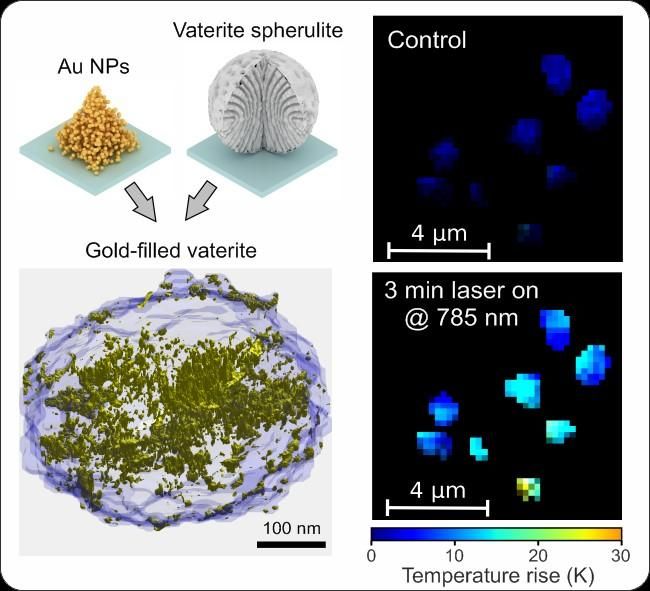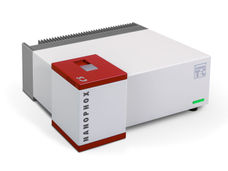Researchers turned transparent calcite into artificial gold
Breakthrough in metamaterials: New material can serve as a platform for innovative cancer treatments
For the first time in the world, researchers at Tel Aviv University developed an innovative nanotechnology that transforms a transparent calcite nanoparticle into a sparkling gold-like particle. In other words, they turned the transparent particle into a particle that is visible despite its very small dimensions. According to the researchers the new material can serve as a platform for innovative cancer treatments.

Figure shows 3D reconstruction of the golden vaterite and the laser-induced heating of the spherulites.
Tel Aviv University
In a new paper published in Advanced Materials, an international team of scientists, coordinated by Dr. Roman Noskov and Dr. Pavel Ginzburg from the Iby and Aladar Fleischman Faculty of Engineering at Tel Aviv University, Prof. Dmitry Gorin from the Center for Photonics and Quantum Materials at the Skolkovo Institute of Science and Technology (Skoltech) and Dr. Evgeny Shirshin from M.V. Lomonosov Moscow State University, has introduced the concept of biofriendly delivery of optical resonances via a mesoscopic metamaterial, a material with properties that are not found in nature. This approach opens promising prospects for multifunctionality in biomedical systems, allowing the use of a single designer-made nanoparticle for sensing, photothermal therapy, photoacoustic tomography, bioimaging, and targeted drug delivery.
"This concept is the result of cross-disciplinary thinking at the interface between the physics of metamaterials and bioorganic chemistry, aiming to meet the needs of nanomedicine. We were able to create a mesoscopic submicron metamaterial from biocompatible components that demonstrates strong Mie resonances covering the near-infrared spectral window in which biological tissues are transparent," says Dr. Roman Noskov.
The nanostructures capable of nanoscale light localization as well as performing several functions are highly desirable in a plethora of biomedical applications. However, biocompatibility is typically a problem, as engineering of optical properties often calls for using toxic compounds and chemicals. The researchers have resolved this issue by employing gold nanoseeds and porous vaterite (calcium carbonate) spherulites, currently considered promising drug-delivery vehicles. This approach involves controllable infusion of gold nanoseeds into a vaterite scaffold resulting in a mesoscopic metamaterial - golden vaterite - whose resonance properties can be widely tuned by changing the quantity of gold inside the vaterite. Additionally, high payload capacity of vaterite spherulites allows simultaneous loading of both drugs and fluorescent tags. To exemplify the performance of their system, the researchers demonstrated efficient laser heating of golden vaterite at red and near-infrared wavelengths, highly desirable in photothermal therapy, and photoacoustic tomography.
Prof. Pavel Ginzburg summarizes: "This novel platform enables the accommodation of multiple functionalities - as simple add-ons that can be introduced almost on demand. Alongside optical imaging and thermotherapy, MRI visibility, functional biomedical materials and many other modalities can be introduced within a miniature nano-scale particle. I believe that our collaborative efforts will lead to in-vivo demonstrations, which will pave the way for a new biomedical technology."
Original publication
Other news from the department science
These products might interest you

NANOPHOX CS by Sympatec
Particle size analysis in the nano range: Analyzing high concentrations with ease
Reliable results without time-consuming sample preparation

Eclipse by Wyatt Technology
FFF-MALS system for separation and characterization of macromolecules and nanoparticles
The latest and most innovative FFF system designed for highest usability, robustness and data quality

DynaPro Plate Reader III by Wyatt Technology
Screening of biopharmaceuticals and proteins with high-throughput dynamic light scattering (DLS)
Efficiently characterize your sample quality and stability from lead discovery to quality control

Get the chemical industry in your inbox
By submitting this form you agree that LUMITOS AG will send you the newsletter(s) selected above by email. Your data will not be passed on to third parties. Your data will be stored and processed in accordance with our data protection regulations. LUMITOS may contact you by email for the purpose of advertising or market and opinion surveys. You can revoke your consent at any time without giving reasons to LUMITOS AG, Ernst-Augustin-Str. 2, 12489 Berlin, Germany or by e-mail at revoke@lumitos.com with effect for the future. In addition, each email contains a link to unsubscribe from the corresponding newsletter.
Most read news
More news from our other portals
Last viewed contents
List_of_discredited_substances

Why your headphone battery doesn't last - Texas Engineers took on the well-known battery challenge of degradation in a real-world technology that many of us use daily: wireless earbuds
Dihydroquinidine





























































